
Elliott Ladd Coues was an American army surgeon, historian, ornithologist, and author. He led surveys of the Arizona Territory, and later as secretary of the United States Geological and Geographical Survey of the Territories. He founded the American Ornithological Union in 1883, and was editor of its publication, The Auk.

John Gould was an English ornithologist who published monographs on birds, illustrated by plates produced by his wife, Elizabeth Gould, and several other artists, including Edward Lear, Henry Constantine Richter, Joseph Wolf and William Matthew Hart. He has been considered the father of bird study in Australia and the Gould League in Australia is named after him. His identification of the birds now nicknamed "Darwin's finches" played a role in the inception of Darwin's theory of evolution by natural selection. Gould's work is referenced in Charles Darwin's book, On the Origin of Species.
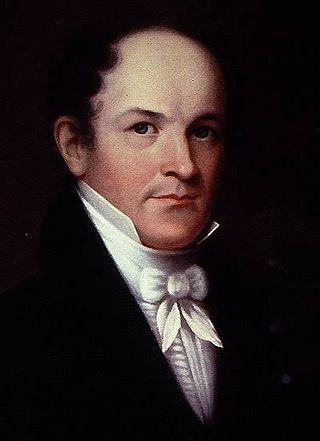
Thomas Nuttall was an English botanist and zoologist who lived and worked in America from 1808 until 1841.

Robert Ridgway was an American ornithologist specializing in systematics. He was appointed in 1880 by Spencer Fullerton Baird, secretary of the Smithsonian Institution, to be the first full-time curator of birds at the United States National Museum, a title he held until his death. In 1883, he helped found the American Ornithologists' Union, where he served as officer and journal editor. Ridgway was an outstanding descriptive taxonomist, capping his life work with The Birds of North and Middle America. In his lifetime, he was unmatched in the number of North American bird species that he described for science. As technical illustrator, Ridgway used his own paintings and outline drawings to complement his writing. He also published two books that systematized color names for describing birds, A Nomenclature of Colors for Naturalists (1886) and Color Standards and Color Nomenclature (1912). Ornithologists all over the world continue to cite Ridgway's color studies and books.
William Gambel was an American naturalist, ornithologist, and botanist from Philadelphia. As a young man he worked closely with the renowned naturalist Thomas Nuttall. At the age of eighteen he traveled overland to California, becoming the first botanist to collect specimens in Santa Fe, New Mexico and parts of California.
The Nuttall Encyclopædia: Being a Concise and Comprehensive Dictionary of General Knowledge is a late 19th-century encyclopedia, edited by Rev. James Wood, first published in London in 1900 by Frederick Warne & Co Ltd.
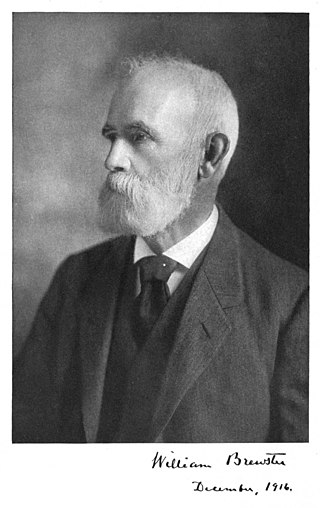
William Brewster was an American ornithologist. He co-founded the American Ornithologists' Union (AOU) and was an early naturalist and conservationist.

Clinton Hart Merriam was an American zoologist, mammalogist, ornithologist, entomologist, ecologist, ethnographer, geographer, naturalist and physician. He was commonly known as the 'father of mammalogy', a branch of zoology referring to the study of mammals.

Nuttall's woodpecker is a species of woodpecker named after naturalist Thomas Nuttall in 1843. They are found in oak woodlands of California and are similar to the ladder-backed woodpecker in both genetics and appearance.

John Treadwell Nichols was an American ichthyologist and ornithologist.

George Henry Falkiner Nuttall FRS was an American-British bacteriologist who contributed much to the knowledge of parasites and of insect carriers of diseases. He made significant innovative discoveries in immunology, about life under aseptic conditions, in blood chemistry, and about diseases transmitted by arthropods, especially ticks. He carried out investigations into the distribution of Anopheline mosquitoes in England in relation to the previous prevalence of malaria there. With William Welch he identified the organism responsible for causing gas gangrene.

Frank Bennington Gill is an American ornithologist with worldwide research interests and birding experience. He is perhaps best known as the author of the textbook Ornithology, the leading textbook in the field.

Alexander Frank Skutch was a naturalist and writer. He published numerous scientific papers and books about birds and several books on philosophy. He is best remembered ornithologically for his pioneering work on helpers at the nest.
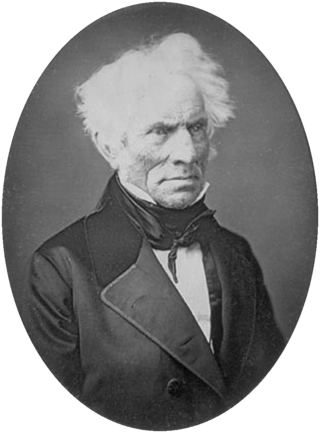
François André Michaux was a French botanist, son of André Michaux and the namesake of Michaux State Forest in Pennsylvania. Michaux père botanized in North America for nearly a dozen years (1785–96) as royal collector for France.

Cordylanthus, commonly known as bird's beaks, is a genus of parasitic plants in the broomrape family, Orobanchaceae. These western North American natives are sparse, weedy-looking annuals with long branching erect stems and little foliage, and many bear bird's-beak–shaped flowers. They are remarkable among the broomrapes for growing at searing temperatures in arid climates.

Lithornis is a genus of extinct paleognathous birds. Although Lithornis was able to fly well, their closest relatives are the extant tinamous and ratites.

Eugene Pintard Bicknell was an American botanist and ornithologist.

The Nuttall Ornithological Club is the oldest ornithology organization in the United States.
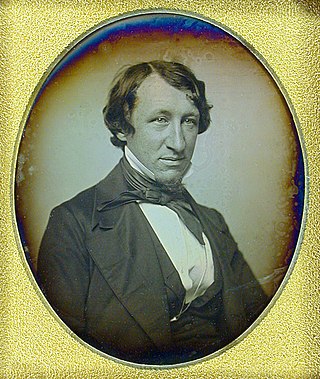
Samuel Cabot III was an American physician, surgeon, and ornithologist, as well as a member of the wealthy and prominent Cabot family.
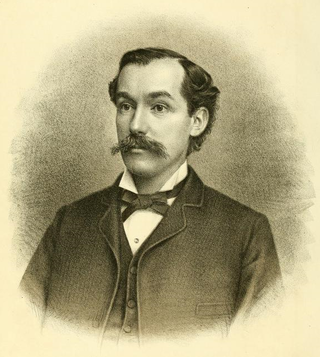
Thomas George Gentry was an American educator, ornithologist, naturalist and animal rights writer. Gentry authored an early work applying the term intelligence to plants.


















